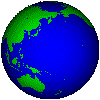

|
Danger of our own Making |
My view of
our country's foreign policy is strongly influenced by what I see and
learn during my extensive international travels. I feel privileged to have
been able to spend time in close to a hundred other countries during the
past 20 years. For the most part I travel on tourist visas and keep my
contact with the locals low key, raising contentious issues circumspectly,
incidentally. While ordinary people with whom I talk generally seem to
reflect their country's national sentiments, individuals express views that span the spectrum
just as they do in our own country. I am surprised how much alike
are Americans and the citizens of other countries when it comes to
criticizing politicians! Opinions about America and Americans have been changing dramatically among the people I have been meeting during the past decade. Prior to 11 September 2001 nearly everyone expressed admiration for America and its values, making little distinction between America and Americans. Since the big shift in our foreign policies after 9/11 that has changed. While careful to emphasize "we still love Americans," one hears pervasive expressions of dismay and fear over the actions of our government. "Arrogant, greedy, selfish, hegemony, dangerous, and power hungry" are heard in conversations as often as "love and admiration." It has now been three years since the political climate began to change. During my 2002-2003 swing through Southeast Asia I continued to hear expressions of admiration for American ideals, but already tempered with hints of fear: might America paint all Muslim countries with the same brush it used to brand the Middle eastern Islamic terrorists? During my 2003-2004 explorations of India and China, America's international escapades were dramatically eclipsed by epic developments in those countries. India and Pakistan finally culminated a long brewing peace accord and China (PRC) focused most of its attention on Taiwan, which it considers a renegade province . When the subject came up at all, America and Americans still provoked admiration, sometimes envy. Our bad government is no worse or better than their bad government, a sentiment which reflects how poorly people are informed of world affairs on that part of the globe. My next journey will take me to some of the
places in Latin America I've missed during previous sojourns. I am
curious to see how people on the street view our country since our
government's adoption of the more bellicose posture toward the rest of the world.
|
|
| The National Security Strategy of the United States of America | This document released
by the Bush administration during 2002 clearly spells out the intentions
of our government to wage wars of preemption. The portions of the
documents I have actually read are reasonable and impressive... well
written. How these policies are being implemented by the present
administration is frightening, disturbing. They presume our
national wealth and military power give us the right, some say the duty to
impose our national will on all cultures and governments that do not
espouse our Western values. That leaders in other parts of the world
resent such hegemony is quite understandable, especially where they have
enjoyed centuries of relative peace and stability on their own. |
|
| Preventive Warriors Documentary | "The film is methodical
and detailed, and careful to include both sides of the debate over the
Strategy: those who welcome it as a means of the US protecting itself
against terrorism, and those who fear that it is no more than a means of a
power-greedy and oil-hungry administration giving itself carte blanche to
take over the world - and, in attempting to do so, possibly trigger World
War Three... The 'stars' of Preventive Warriors are its heavyweight interviewees, from internationally renowned author Noam Chomsky, to Tariq Ali, editor of The New Left Review, to US talk show host Phil Donahue." (60 minute YouTube film) Fred |

